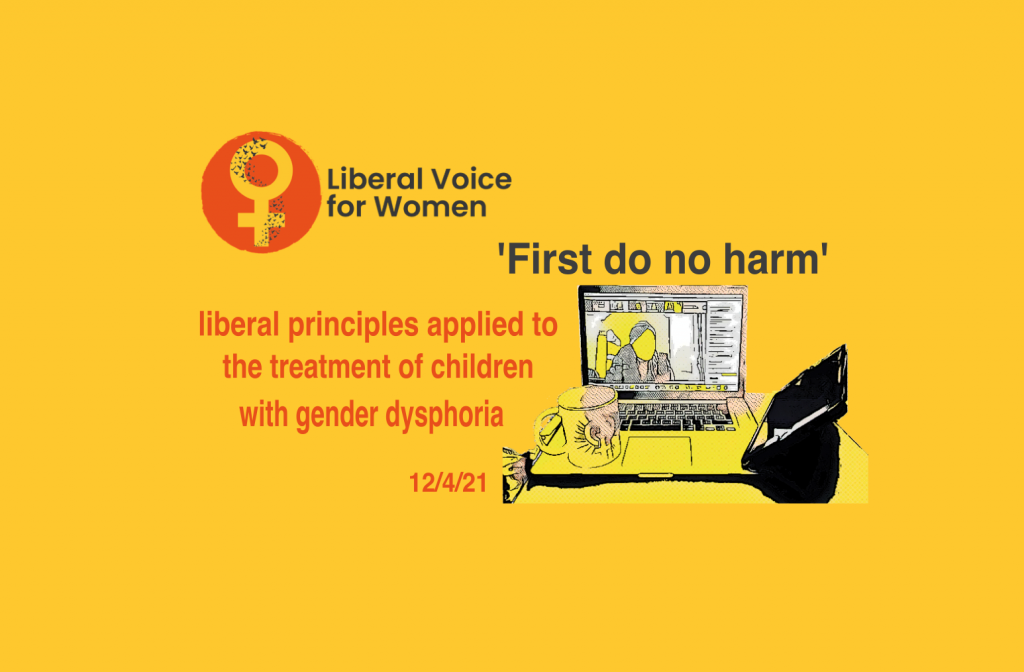
I’m not a Liberal Democrat, or a Conservative, or a whatever-it-is-that-people-in-the-Labour-party-call-themselves-these-days but, when there doesn’t seem to be a political party in the entire country willing to admit to knowing what a woman is, attending an event such as this seemed important. So on the evening of 12th April 2021, I attended a Zoom event organised by Liberal Voice for Women.
Alison Jenner, with Heather Brunskell-Evans, Stella O’Malley and Stephanie Davies-Arai.
LVW maintain that “Women and girls are female and, as such, have distinct needs and interests. Only by basing policy in such biological reality can women maintain their rights and combat sexism.”
As recently as a decade ago, this would have been seen as a fairly common-sense approach to protecting the rights of women and children. Now, in the current political climate, it is no surprise that LVW reveals that “some of us have experienced unpleasant behaviour within the party, particularly, and ironically, from some male activists wearing the badge of ‘feminist’.”
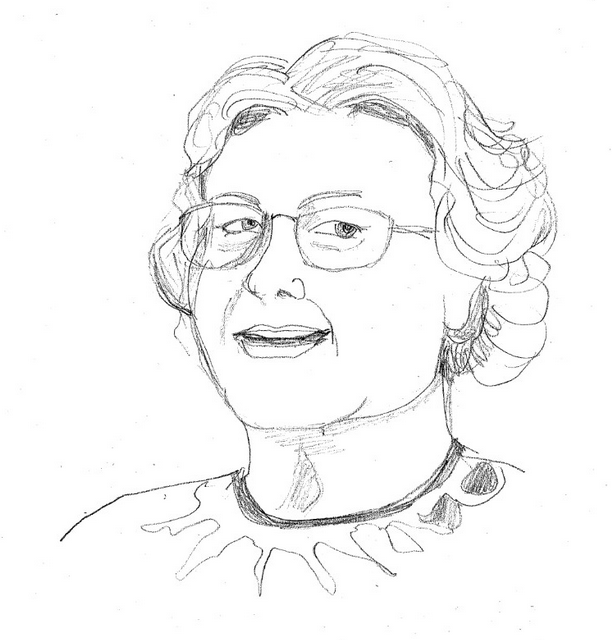
The event was chaired by Councillor Alison Jenner
Nonetheless, LVW had organised this sell-out event, three talks touching on how liberal principles could be applied to the treatment of children with gender dysphoria, followed by a Q&A. The event was chaired by LibDem councillor Alison Jenner. I was looking forward to it: the speakers were all women I admire and registering for my ticket early turned out to be a good move: several of my friends left it too late, which did leave me wondering exactly how a Zoom event sells out? Is this the new Glastonbury?
The LibDems may not be speaking out for women’s sex-based rights, but neither are any of the other parties (and yes, you can include the Women’s Equality Party in that). The fact that LVW has been established fills me with hope that UK party politics may again begin to concern itself with women’s sex-based concerns and rights. Inextricably tied up in the battle for women’s sex based rights is the battle to protect children suffering from gender dysphoria. When we say a man can become a woman, it eventually follows that a girl can become a boy. This is a relatively new ideology: when Ray Davies sang ‘girls will be boys and boys will be girls’ we can be pretty sure he wasn’t referring to giving ten year olds puberty blockers.
After the event was over, I found myself wishing that members of all political parties could have heard these three wise women speak. It would have been absurd to suggest there was hatred or bigotry in the words spoken by any of them, just a deep concern and desire to protect the rights and safety of children in a climate that seems exponentially determined to ignore them.
So here’s my report on the meeting, with pencil sketches by Michèle.
 The event started at 7pm. Jenner invited us to put our Zoom screens on ‘speaker view’, our questions in the chat bar and added with a twinkle, “help yourselves to whatever drinks and nibbles you wish.”
The event started at 7pm. Jenner invited us to put our Zoom screens on ‘speaker view’, our questions in the chat bar and added with a twinkle, “help yourselves to whatever drinks and nibbles you wish.”
I definitely had that side of things under control, a chilled can of Pepsi Max Cherry a banana and two bags of hula hoops by my side. Living it large.
RIP Shirley Williams
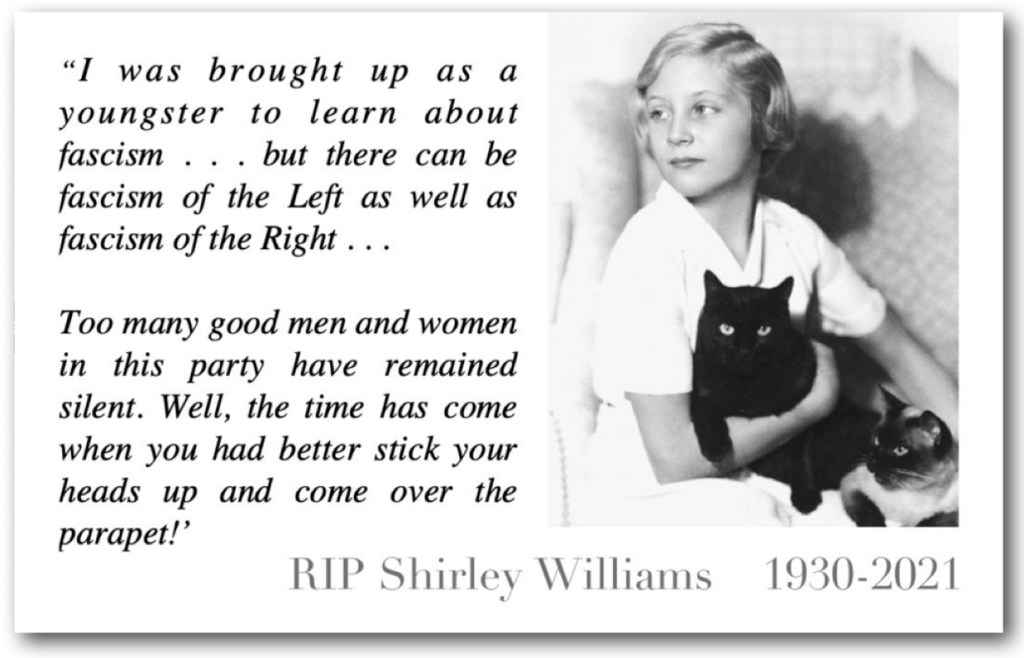 Alison said that before we started she’d like to take a moment to reflect on the life of ‘towering intellect’ Shirley Williams, who died on 12/4/21. Williams was one of the founder members of the Social Democrat Party (which, through a series of incarnations over several decades, kind of ‘became’ the LibDems) “spending 50 years at the centre of British & International political debate”.
Alison said that before we started she’d like to take a moment to reflect on the life of ‘towering intellect’ Shirley Williams, who died on 12/4/21. Williams was one of the founder members of the Social Democrat Party (which, through a series of incarnations over several decades, kind of ‘became’ the LibDems) “spending 50 years at the centre of British & International political debate”.
The Liberal Voice for Women
These LVW meetings, Jenner said, would focus on topics “which we feel our party needs to address”. The LVW was disappointed that it had “proposed a motion on protecting children from treatment with puberty blockers” but that it had not been accepted at the Spring conference. LVW had also hoped to hold a fringe session of conference, continued Jenner, but it had not been allowed. You can see the motion here, on the LVW website. Jenner hopes the motion will be debated this autumn & that party policy can be changed. I hope her optimism will not be unfounded.
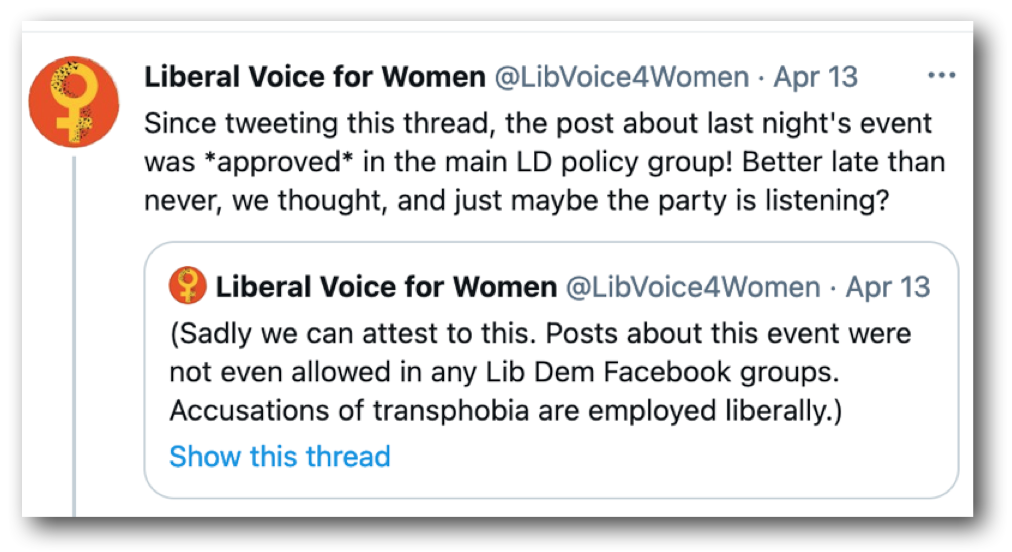 The party seems to be fairly thoroughly captured-in fact, as LVW tweeted the next day, even references to this ‘First Do No Harm’ event had been removed from the LibDems’ facebook page, although they were later reinstated.
The party seems to be fairly thoroughly captured-in fact, as LVW tweeted the next day, even references to this ‘First Do No Harm’ event had been removed from the LibDems’ facebook page, although they were later reinstated.
A Short Biography of the Speakers
Jenner noted that Brunskell-Evans, O’Malley and Davies-Arai were “three women with expertise and experience” who the speakers had hoped to host at the fringe session and she was “delighted to be able to welcome (them) to our own space.”
She concluded by giving us a brief biography of each.
 Dr Heather Brunskell-Evans is a philosopher and social theorist with particular expertise in the politics of ethics medicine, the sexed body, and gender. She is an academic, co-founder of the Women’s Human Rights Campaign and co-author of the Declaration on Women’s Sex-based Rights. She has co-edited, with Michele Moore, the books Transgender Children- Born in Your Own Body and Transgender Children and Young People. Heather campaigns against the scandal of gender identity development medicine and for children’s human rights to freedom from bodily harm and from gender. Her latest book is Transgender Body Politics.
Dr Heather Brunskell-Evans is a philosopher and social theorist with particular expertise in the politics of ethics medicine, the sexed body, and gender. She is an academic, co-founder of the Women’s Human Rights Campaign and co-author of the Declaration on Women’s Sex-based Rights. She has co-edited, with Michele Moore, the books Transgender Children- Born in Your Own Body and Transgender Children and Young People. Heather campaigns against the scandal of gender identity development medicine and for children’s human rights to freedom from bodily harm and from gender. Her latest book is Transgender Body Politics.
 Stella O’Malley is a psychotherapist who works in private practice in Ireland, specialising in parenting, family dynamics, and working with teenagers with emphasis on mental health and wellbeing. She is the author of Cotton Wool Kids and Bully-Proof Kids, and more recently Fragile which explores the reasons why people are feeling more anxious and stressed than ever before. Stella was presenter of the 2018 Channel 4 documentary Trans Kids: It’s Time to Talk. Stella also contributed a chapter to the book Inventing Transgender Children and Young People. She is a Clinical Advisor for the Society for Evidence-based Gender Medicine, a founding member of the International Association of Therapists for Desisters and Detransitioners, and the lead facilitator for the Gender Dysphoria Support Network.
Stella O’Malley is a psychotherapist who works in private practice in Ireland, specialising in parenting, family dynamics, and working with teenagers with emphasis on mental health and wellbeing. She is the author of Cotton Wool Kids and Bully-Proof Kids, and more recently Fragile which explores the reasons why people are feeling more anxious and stressed than ever before. Stella was presenter of the 2018 Channel 4 documentary Trans Kids: It’s Time to Talk. Stella also contributed a chapter to the book Inventing Transgender Children and Young People. She is a Clinical Advisor for the Society for Evidence-based Gender Medicine, a founding member of the International Association of Therapists for Desisters and Detransitioners, and the lead facilitator for the Gender Dysphoria Support Network.
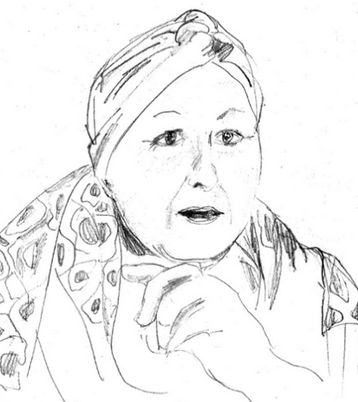 Stephanie Davies-Arai is the founder and Director of Transgender Trend, the leading UK organisation in the call for evidence-based healthcare for gender dysphoric children and science-based teaching in schools. She was founder and parent governor of a small school in East Sussex and spent over 8 years training staff and running courses for parents & pupils as well as designing policies. Author of Communicating with Kids, Stephanie is a communications skills trainer who has provided training and workshops for teachers and parents for over 20 years.
Stephanie Davies-Arai is the founder and Director of Transgender Trend, the leading UK organisation in the call for evidence-based healthcare for gender dysphoric children and science-based teaching in schools. She was founder and parent governor of a small school in East Sussex and spent over 8 years training staff and running courses for parents & pupils as well as designing policies. Author of Communicating with Kids, Stephanie is a communications skills trainer who has provided training and workshops for teachers and parents for over 20 years.
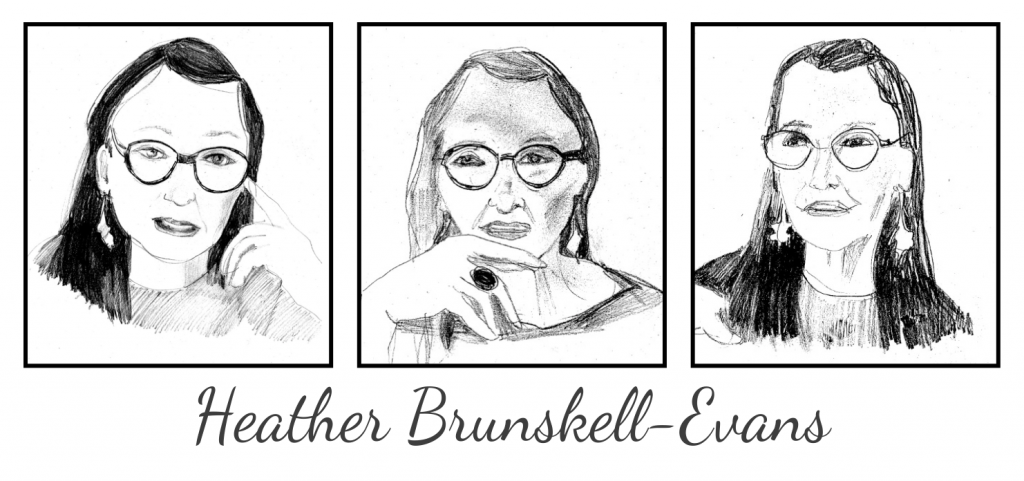
Brunskell-Evans was first to speak, telling us she was going to start by making a bold statement.
“What I want to say is that the LDP has an extremely illiberal official position on transgender identity and children. I’ll demonstrate this by taking a statement the party made about the judicial review of the Tavistock and puberty blockers, as well as other official statements on the Tavistock and transgender identity which were made by the party’s leader, Ed Davy and Lena Moran, the spokeswoman for foreign affairs.”
Heather gave us a quick review of the Autumn 2020 review of GIDS at the Tavistock, carried out at the High Court in London and brought by Keira Bell, an ex-patient. She reminded us that Bell was referred to the Tavistock age 16, “believing becoming male would solve her problems”. Heather also reminded us that recently the lower age for prescribing puberty blockers to gender dysphoric children has been dropped from 16 to the early stages of puberty, which for some children is as young as 9 or 10.
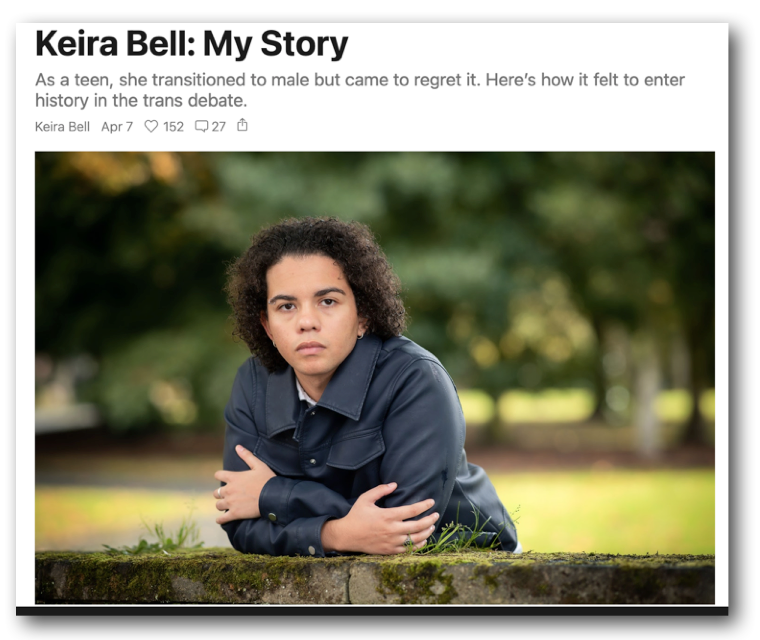 Bell’s “deep distress about her sexed body” and and psychological issues were not addressed and she was referred for puberty blockers after just three appointments. Heather tells us that GIDS “(allowed Keira) to run with the unrealisable fantasy that she could actually change sex”.
Bell’s “deep distress about her sexed body” and and psychological issues were not addressed and she was referred for puberty blockers after just three appointments. Heather tells us that GIDS “(allowed Keira) to run with the unrealisable fantasy that she could actually change sex”.
Keira, now 24, went on to take testosterone a year later and have a double mastectomy when she was twenty. Subsequently she accepted herself as female and stopped taking testosterone. You can read her story in her own words here.
Bell asserted to the court that such a medical pathway is unlawful since children can’t give consent to these life-changing and irreversible treatments.
Brunskell-Evans said it was important to acknowledge that during the case the term ‘transgender child’ was never used, but rather the phrase ‘a child with gender dysphoria’. She drew our attention to the difference implications of these two phrases.
Expert witnesses had provided the court with evidence concerning the dangers of puberty blockers, including sterility (children on blockers almost invariably progress to cross-sex hormones) & lack of sexual enjoyment and function as adults. The court’s attention was also drawn to the lack of evidence for the efficacy of puberty blockers in improving mental health. (A recent NICE study upholds this position.)
The court concluded that due to the ‘experimental nature’ of puberty blockers and that they are “a crucial stepping stone to cross-sex hormones and eventually surgical interventions, children aged 16 and under have a reduced capacity to consent to medical transition” or understand its consequences in adulthood.
“One might ask therefore,” speculated Heather, referring to the LibDems response to this, “in which moral universe, or view of social justice for children- for children’s autonomy; body integrity; the right to be safeguarded and so on- in which moral universe could the court’s ruling be refuted?”
In response to the court’s ruling, the LibDems had released a statement entitled ‘Young Trans people must have autonomy over their own care’. Brunskell-Evans said she would like to draw attention to four main points of concern within the LibDems’ statement.
Firstly, she said, the statement claimed that the court’s judgement shows ‘damaging impact of alarmist rhetoric around trans young people’, suggesting both that the judges were biased and that their concerns about puberty blockers were hyperbole.
Secondly it claimed- without producing any evidence, and in contrast to what the evidence presented to the court showed to be true- that puberty blockers are a safe and effective treatment. The party’s claim, asserts Heather, is “flying in the face of all scientific evidence’ and ‘the party has tied itself to an anti-scientific, no-evidence-based, ideological position which harms children.”
In the LibDems’ statement, she said, children were referred to six times as ‘being transgender’, not as having a condition (gender dysphoria) but as being something. The statement also suggested that children not given blockers will ‘undergo the wrong puberty’, again suggesting that ‘being trans’ is a real condition and that a young person’s body can be mismatched with an authentic, true identity’.

Terminology is important, asserted Heather, observing that “the claim for inherent transgenderism belongs to a set of unevidenced, incoherent but powerful ideas and these ideas are the foundation of LibDem policy on trans rights.”
Brunskell-Evans reminded us that LibDem leader Ed Davy & Spokesperson for Foreign Affairs and International Development Leila Moran both claim, “a woman is self-identified by the individual him/herself” ergo a transwoman is a woman and a transman is a man- because they say so.
In philosophy, clarified Brunskell-Evans, this is called an ontological statement. To say that a transwoman is a woman, not a man who identifies as a woman, is making an erroneous ‘truth claim’, a claim about reality rather than a description.
Moran is also on record as saying- which Heather suggests shows she does actually know the above not to be true- “where is the harm? It will make trans people happier and improve their mental health.’
As mentioned above, there is some dispute as to whether such treatments really do improve mental health issues, and there is certainly clear suggestion that self-identification does indeed cause harm.
Heather advocates that the harm to children is extremely serious. These ideas, she said, have emerged from queer theory over the last 30 years and lobby groups have helped to bring about a ‘reversal of reality’ which the LibDem policy reflects.
Whether one is male of female is an empirical reality, asserted Heather, and gender is a social construction. This idea is supported by different historical and cultural contexts when different expectations are placed on men and women. But in queer theory it is biological sex which is assigned rather than observed and gender identity is seen as non-social or pre-social, in a way that she described as “an inner authentic or true self almost akin to a soul”. Brunskell-Evans asked rhetorically where this theory leads us and cited the example of lobby group Gendered Intelligence (GI).
GI, who are appealing against the court decision in the Keira Bell case, claim ‘trans children are real’, and that they can have numerous different forms of identity, which Heather described as ‘a HEINZ variety of soups’. Their booklet for young people advocates that trans-identified children have an existential choice to go down one of two routes, or both. Firstly, there is the medical pathway, which the booklet illustrates with ‘crude cartoons of children and young people who have undergone surgical transition’. Or, children are told, they can transition socially: GI informs kids that within the trans community it’s identity that more important than physical reality.
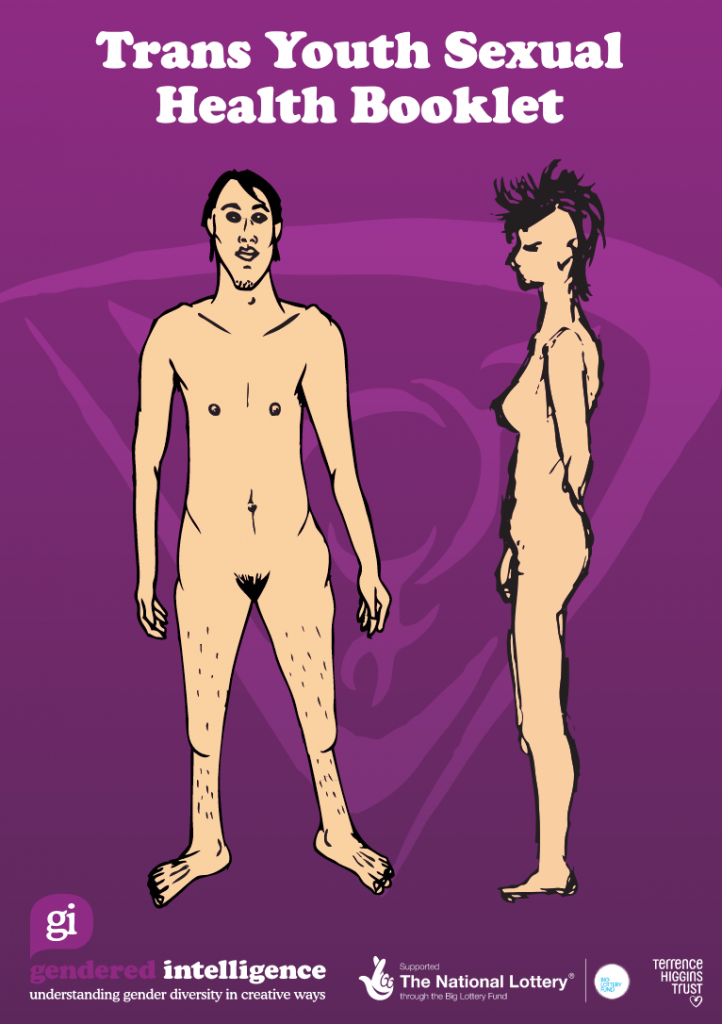 Your identity is paramount, she says, quoting from the Gendered Intelligence ‘Trans Youth Sexual Health’ booklet, which tells young people:
Your identity is paramount, she says, quoting from the Gendered Intelligence ‘Trans Youth Sexual Health’ booklet, which tells young people:
“A woman is still a woman even if she likes getting blow jobs. A man is still a man even if he likes getting penetrated vaginally.”
“This,” Brunskell-Evans said, “is the social context in which children are finding their identities.”
The fourth ‘very troubling’ thing she found about the LibDem statement was the suggestion that those concerned about the transgendering of children, and the impact on children and young people of puberty blockers, are ‘transphobes’. In conclusion she told us:
“The accusation of transphobia doesn’t refer to phobia in the normal way we would think about it, which would be fear or hatred of trans-identified people… what is being denounced is non-compliance with a set of ideas…. In a wholly autocratic and authoritarian moot, the Liberal Democratic Party… which prides itself on liberalism, is shutting down any exploration and exchange of ideas that could contribute to a reasoned appraisal of the ethics of transgendering children.”
“That was really interesting,” observed Jenner, “and it’s kicked us off in a very forthright manner, thank you.”
Turning to Stella O’Malley, Jenner asked, “Stella, Your film ‘Trans kids” was very moving, about the goals and the outcomes of those young people who transitioned. How do you see the public understanding around dysphoria playing out?”

Stella introduced herself, saying she was a psychotherapist who had an ‘intense’ experience with what we would now call gender dysphoria between the ages of three and ten. When she looked back and wonders ‘why was I like that?’ she feels that her younger self was an ‘infernal misogynist’.
“Boys were better, boys were stronger, boys were faster. I thought girls were prissy and silly and annoying with their high voices.” She laughed, wryly. “How dare I?”
Raised in Dublin in the 70s, Stella was the only girl who wore trousers to school. “I was very bolshy,” she admits, “I was a very unhappy kid.” She says she felt ‘very compelled’ to be the way she was. She both hated and was haunted by the frequent question “are you a boy or a girl?’ and would reply ‘yes’ or ‘no’, revelling in the discomfort of the adult who had asked the question.
“When puberty hit, had I known about the concept of ‘transkids’, of the concept of puberty blockers, I would have crossed the ocean to get at them.”
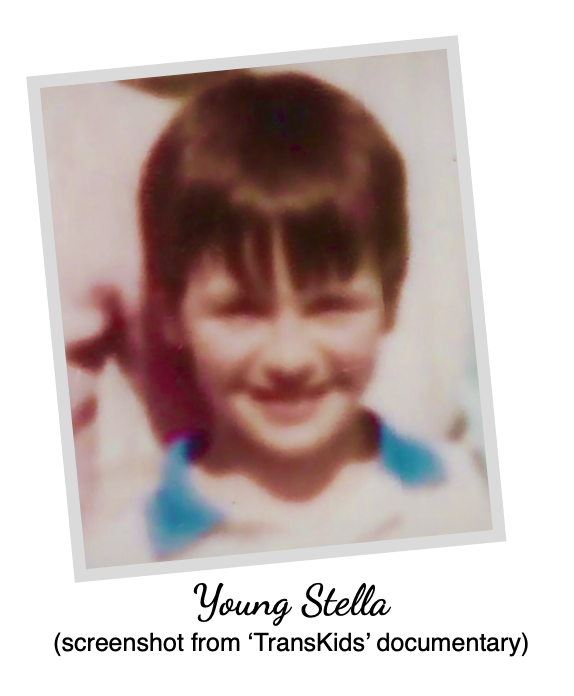 Stella says she had a very driven, intense personality as a child, and that saving face and being perceived as being right were very important to her. She feels it’s important to acknowledge that a child who is ‘insistent, consistent and persistent’ (one of the criteria for a diagnosis of gender dysphoria) is expressing personality traits. The milder kids, she says, are less likely to be so intense in their pursuit of puberty blockers because of their personality rather than because of the intensity of their gender issues. This, she says, is not taken into account when treating gender dysphoric kids.
Stella says she had a very driven, intense personality as a child, and that saving face and being perceived as being right were very important to her. She feels it’s important to acknowledge that a child who is ‘insistent, consistent and persistent’ (one of the criteria for a diagnosis of gender dysphoria) is expressing personality traits. The milder kids, she says, are less likely to be so intense in their pursuit of puberty blockers because of their personality rather than because of the intensity of their gender issues. This, she says, is not taken into account when treating gender dysphoric kids.
Anyone who knows anything about psychology should see the ‘insistent, consistent, persistent’ idea as a flawed concept, she added.
When O’Malley was about nine a ‘tough, boyish, amazing and very butch’ friend of her sister took her into a corner and warned her, ‘You wanna watch yourself, I was like you and it was really hard to get out of it, you wanna watch yourself.”
The girl’s words had a huge impact on, and were a pivotal moment for, Stella. She remembers realising, “I couldn’t even say the words,’ I’m in prison. I can’t get out of this’.”
For Stella, there were no puberty blockers. She describes her puberty as difficult, ‘a very dark time’ where she was ‘alienated and disconnected’ from her body. Yet post puberty, Stella says she became completely comfortable in her skin and her body. She now has two children of her own and she is “horrified by the idea that I could have been somebody who was offered these concepts and ideas when I was a vulnerable and unhappy kid.”
Describing her childhood self as ‘belligerent, insistent, very cocky, arrogant and pushy’ she adds that she knew adults were intimidated by her gender presentation. “I was very aware of my impact”.
As an adult, Stella used to say she had been a ‘tomboy’ but so many other women used that word to describe themselves she came to realise that it diminished the intensity of her experience. She knew what she had gone through was something deeper. In her 30s, she trained to be a psychotherapist and ‘wrote a few books’. She remembers noticing in the 1990s that the T had been added to the LGB and thinking “that’s insane, because sexual orientation is very different to gender identity, and why would you conflate them?”
“This was when you could speak freely, back in the old days,” she observed, adding that although she would often ask why, she never got an answer.
Around 2015/16, Stella noticed that trans issues were featured heavily in the media and she read the articles with interest, aware that had she led a different life she might have transitioned. This led her to follow the subject closely and when she saw how the concept of trans kids was evolving she wrote an article about it, despite being warned by her sister and her husband that she would be silenced and criticised.
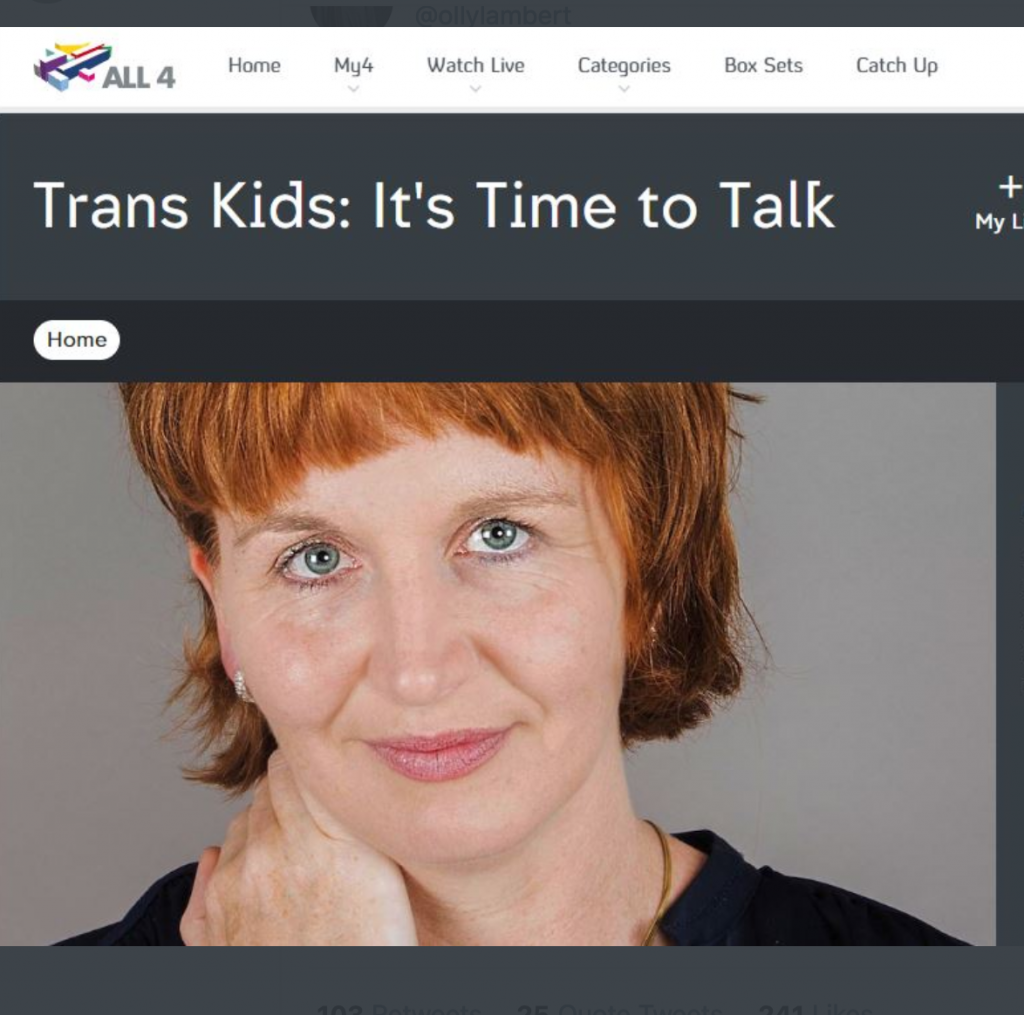 The main point of her article was wondering if any of these kids might have been like her. As a result of the article, Channel 4 asked her to do the documentary. O’Malley told us she had been aware of the toxic environment surrounding trans issues, but thought that this was why she needed to be involved and have something to say.
The main point of her article was wondering if any of these kids might have been like her. As a result of the article, Channel 4 asked her to do the documentary. O’Malley told us she had been aware of the toxic environment surrounding trans issues, but thought that this was why she needed to be involved and have something to say.
If you are in the UK, the documentary is available to view free on All4 at the time of writing.
“For me, I was coming at it thinking, could any of the kids that are being now called trans kids, could any of them be like me? Was there any possibility… and if they are, what are we doing by calling them trans kids and what are we doing by giving them puberty blockers? And are we foreclosing on these kids’ options by labelling them before they should be labelled and channelling them before they should be channelled?”
Stella said she now knows that statistics show that 80% of kids that are ‘left to it’, like she was, end up being comfortable in their own skin. She reminded us that research shows that, if these kids are given puberty blockers, that 80% reduces to about 2%. She says she now knows that her hunch was right, but that she had no idea of the depth of it at the time.
“Now I know it, I’m horrified.”
Stella knows Keira Bell and says that Bell reminds her of her younger self. “She was just lost and I was lost and when you’re lost you’re vulnerable and it’s very easy to say THAT’S the solution. When people simplify your narrative you nod very quickly.”
“I went in green,” she says of her involvement in the ‘transkids’ documentary, observing that by bringing in ‘an Irish psychotherapist who didn’t know anybody’, Channel 4 had hoped they could avoid accusations of transphobia. After all, it was clear that O’Malley had no agenda.
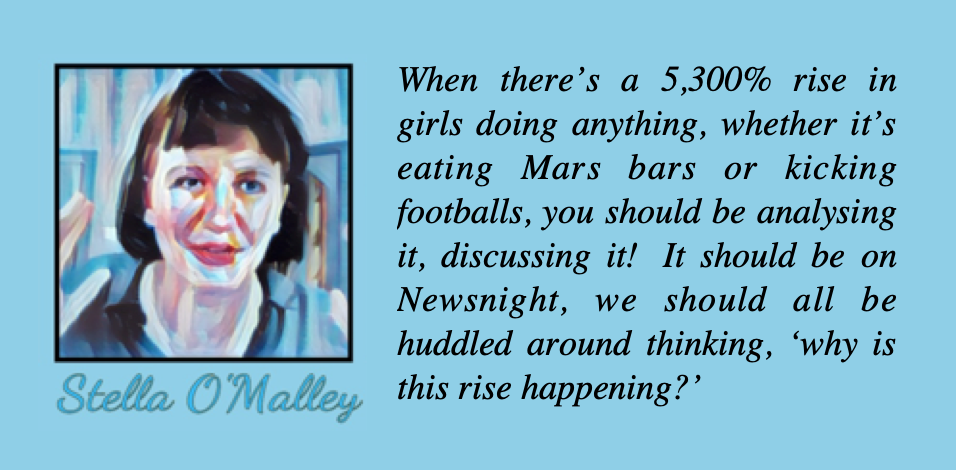 “The numbers are so insane,” she says, referring to the huge increase in kids presenting to GIDS at the Tavistock over the last decade, the majority of whom are girls, “that you can’t get your head around it. When there’s a 5,300% rise in girls doing anything, whether it’s eating Mars bars or kicking footballs, you should be analysing it, discussing it! It should be on Newsnight, we should all be huddled around thinking about ‘why is this rise happening?’. And instead the debate is being shut down.”
“The numbers are so insane,” she says, referring to the huge increase in kids presenting to GIDS at the Tavistock over the last decade, the majority of whom are girls, “that you can’t get your head around it. When there’s a 5,300% rise in girls doing anything, whether it’s eating Mars bars or kicking footballs, you should be analysing it, discussing it! It should be on Newsnight, we should all be huddled around thinking about ‘why is this rise happening?’. And instead the debate is being shut down.”
Many trans-identified people and their families were interviewed for the documentary. Then the crew tried to get people from the ‘other side’ to give their views. Stella names, among others, Mermaids, Stonewall, Owen Jones, Juno Dawson, Helen Webberley and the Tavistock. None of them would talk to her.
The team were told that they had heard O’Malley was ‘problematic’.
“It was unbelievable, this feeling of being absolutely blacklisted… how could I have been problematic?” she asked us, still clearly astounded. “I was an ordinary, working psychotherapist who’d written three books on mental health. I’d had an experience and I just wanted to know… could it be that any of those girls were me? They said, ‘no, I won’t speak to her.'”
No one would speak to the film crew, despite it being a fairly prestigious project, a Channel 4 film with Emmy winning director, war correspondent Olly Lambert. Lambert later said it was harder to get people to talk about the subject of ‘trans kids’ than it was to get political leaders to discuss the issues between Israel and Palestine. When he had worked on that production, both sides of the debate had agreed on the importance of interviewing both sides, telling him ‘and so you should… that is how civilisation progresses’.
Eventually, the makers of ‘Trans Kids’ decided to make a feature of having been no platformed, acknowledging in the film their failed attempts to approach the pro-transition lobby. When the documentary was released in November 2018, O’Malley describes the push back as having been ‘quite intense’.
“I received a lot of abuse and an awful lot of horrible things happened,’ she remembers, adding that she also received ‘a lot of warmth and real support’ leading her to experience ‘a really beautiful feeling’ of sisterhood for the first time.
“People are being silenced, people are being denigrated; people are being lied about,” said Stella, “and everybody is afraid to enter the debate; everybody is afraid to say their piece say ‘hang on, what does that mean?’ Everybody is afraid to ask questions. It’s a really frightening world and once you’re in it you just think, oh my god, you could look away from this but it’s the wrong thing to do- because something really awful has unfolded here.”
O’Malley remembers during filming being told that there were transwomen in English prisons and asking, ‘surely that would be dangerous?’. She was told it was transphobic to ask that question.
After Karen White (a man) assaulted women in prison, she was told that it was transphobic to refer to White as a woman.
When women get assaulted, she observed, she will no doubt told it’s transphobic to ask if some of the most vulnerable people in society are being put at risk by these policies.
Stella now works as a therapist with detransitioners and desisters and runs meetings for the GDSN for families of people who have been impacted by gender dysphoria, including parents and siblings, some of whose lives have been ‘absolutely ripped apart’.
“I really urge people not to be frightened,” she concluded. “Join in and ask the questions that you feel you’re not allowed to ask. You might think they’re stupid questions but they’re not. You’re being silenced and you’re probably scared to speak but I really would urge people that it’s better when you do.”
Jenner thanked Stella and agreed on the importance of speaking out and asking questions ‘because we need to have answers’.
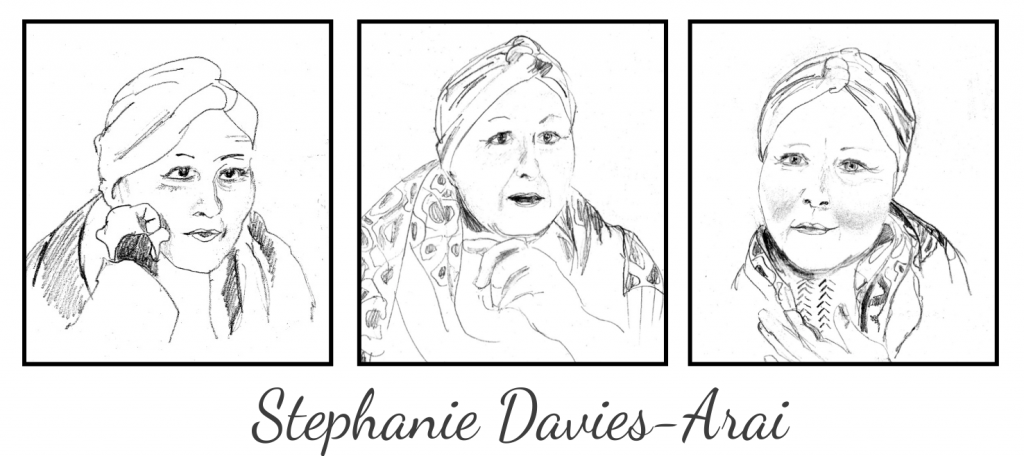
Stephanie started by saying that Stella and she had shared a very similar experience of gender dysphoria within a difficult childhood and adolescence. The most important thing for Stephanie as a child was being tough, When adolescence hit, she found herself “fighting becoming a woman, as my body completely betrayed me and I could no longer be that boy who was better and tougher than the other boys.”
Davies-Arai told us that she was going to talk about girls; specifically about that 5,300% increase in girls presenting to GIDS; about how it’s girls and women who are being silenced and the female sex that is being erased.
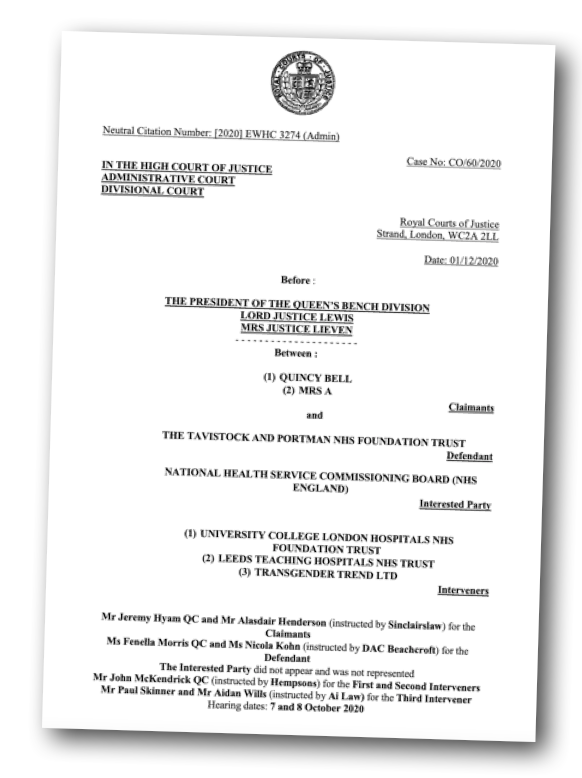 Stephanie’s written statement was accepted as evidence by the High Court during the judicial review mentioned earlier and commonly referred to as the ‘Keira Bell case’. In her statement she had mentioned vulnerable groups: autistic, gay & lesbian children and children with past trauma but her statement focused on girls because Keira was a girl. The judges acknowledged that the cultural context of Keira’s situation was important.
Stephanie’s written statement was accepted as evidence by the High Court during the judicial review mentioned earlier and commonly referred to as the ‘Keira Bell case’. In her statement she had mentioned vulnerable groups: autistic, gay & lesbian children and children with past trauma but her statement focused on girls because Keira was a girl. The judges acknowledged that the cultural context of Keira’s situation was important.
Stonewall & Mermaids were both denied permission to intervene in the case.
You can read the results of the judicial review here.
“Freedom of speech is the cornerstone of a liberal democracy,” observed Stephanie, and when speech is policed a society loses its basic human right. Over the last decade we have seen ‘the imposition of an extreme gender ideology’, one which includes the belief that a person with a penis is a woman and that biological sex is a social construction. The idea that the only true reality is gender identity is a concept with no scientific basis yet it is an ideology which has captured institutions such as the government and health and education systems.
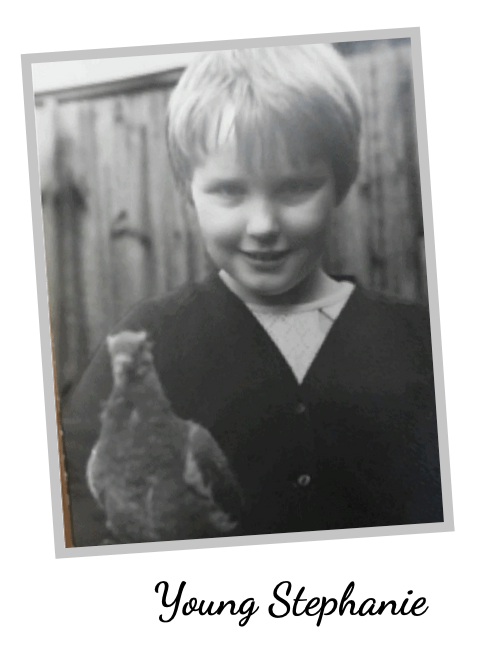 “A belief by definition requires no proof and a faith must be followed and defended at all costs.”
“A belief by definition requires no proof and a faith must be followed and defended at all costs.”
Non-believers in the ideology will be punished, cancelled, threatened and intimidated; women who resist are called ‘TERFS’ and threats to kill and rape them are sanctioned. Clinics that don’t follow the model of affirmation will be shut down.
“When gender-neutral language is used, it is men who are set as the default,” observed Stephanie. “It is the female sex that is erased.” We need to be able to distinguish between the sexes but we are no longer allowed to do this. Instead we are told that any debate or question ‘erases trans people’, despite there being no evidence that this is true. So we must say that transwomen are women and we must say that a rapist is a woman. If we don’t or won’t say this, we are called ‘transphobic’. Women are now being called ‘pregnant people’ and ‘menstruators’.
“We have reached the point,” she said, “where only men can be women”.

JK Rowling
As an example of this, JK Rowling’s support of safe spaces for women who have been subject to male violence was called ‘bigoted’ and she was vilified in the press and on social media. The reading of her essay was not that she was pro-women but that she was anti-trans. In the ensuing backlash, fans posted pictures of themselves burning her books on social media.
“Women’s speech has been silenced but men’s has not,” said Stephanie. Women are silenced while men have free reign to attack and abuse women online. She pointed out that his generation of girls is growing up learning from this. Girls are learning what they can and can’t speak about and that speaking about unique female experience and feminist discourse will mark them out as bigots.
While older women are protesting and setting up grass roots organisations, the younger generation has been indoctrinated into this view and encouraged to see ‘TERFs’ as nasty bigots. This movement, asserted Davies-Arai, is not about trans rights, but about promoting an ideology. The indoctrination takes place not only by the media and on social media platforms, but on YouTube, where hundreds of thousands of teenage girls follow ‘transition’ videos, and in schools, where young people are being taught that being a boy or girl rests entirely on identity, on feelings, and not on biological fact. Your gender identity is sold as being your authentic self, not your biological sex, “which was assigned, possibly wrongly, by an outside agency”.
Stephanie observed that the ideology is part of children’s education now. She has counted thirty books for ‘early years’ (the under-5s) about transgender children.
Davies-Arai agreed with O’Malley that there is an internalised misogyny within girls who identify as boys. The idea that “girls are weaker and silly and boys are the real people; boys are interesting; boys are the real human beings.”
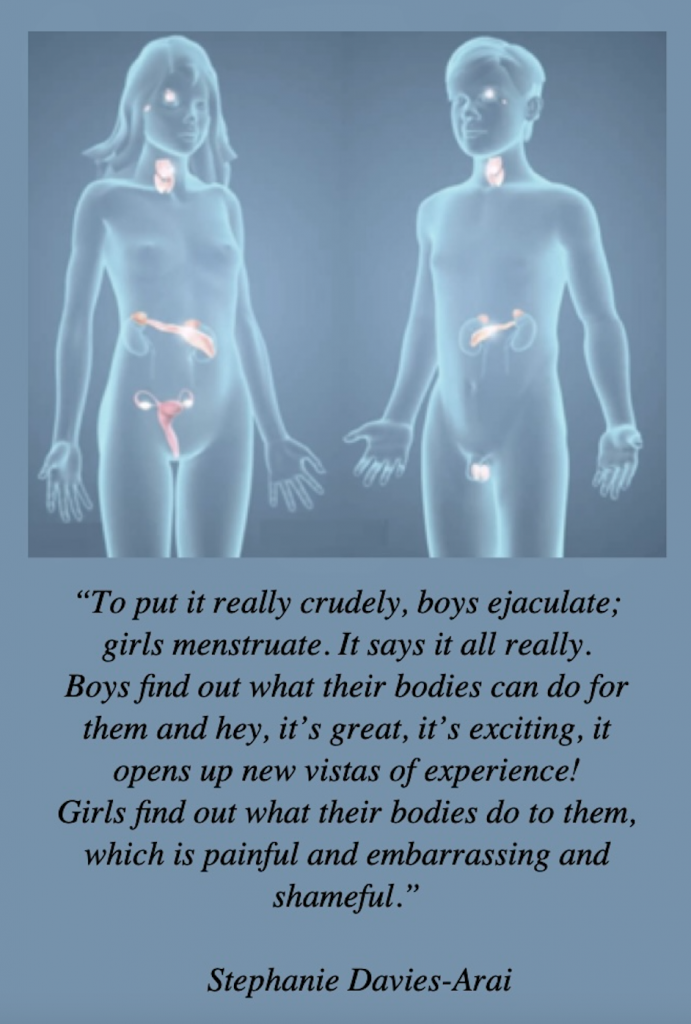 There are many important biological and psychosocial difference between boys and girls during adolescence. Stephanie clarified that if we can’t speak about those things, we cannot understand them.
There are many important biological and psychosocial difference between boys and girls during adolescence. Stephanie clarified that if we can’t speak about those things, we cannot understand them.
“To put it really crudely, boys ejaculate; girls menstruate. It says it all really. Boys find out what their bodies can do for them and hey, it’s great, it’s exciting, it opens up new vistas of experience. Girls find out what their bodies do to them, which is painful and embarrassing and shameful: you can’t talk about periods… It’s a completely different experience.”
Stephanie was clear that she is not suggesting that boys sail through puberty with no issues, but that the difference between boys and girl in biological change at puberty is massive.
“ A boy’s world expands in puberty: his body grows in strength… whereas a girl’s world shrinks… girls tend to give up sport because they’re embarrassed, the development of breasts and hips is so much more visible… suddenly for girls their bodies become public property, they can be shouted at, commented on sexually harassed, touched and abused.”
Girls go from being a human being to becoming an object, a thing, and learning that the most important thing about them is their looks; whether they measure up to the ideal ‘sexy and hot’ girl portrayed as desirable in the media. The pressure on girls to pay large amounts of time to their appearance has grown exponentially in the last few decades. Davies-Arai says it is no secret that this has become more so with the advent of online porn, especially porn accessed on phones in schools. Girls often lose their ambition at puberty, and the sexualisation of girls begins at an ever younger age.
 As the market for ‘pinkification’ and gendered toys and clothing has grown, so stereotyping of both boys and girls has increased. Davies-Arai said she is surprised that there is no regulation of marketing within the childhood toy, clothing & book industries.
As the market for ‘pinkification’ and gendered toys and clothing has grown, so stereotyping of both boys and girls has increased. Davies-Arai said she is surprised that there is no regulation of marketing within the childhood toy, clothing & book industries.
“We have known for some time of the detrimental and devastating effect on girls of sexualisation and objectification,” reported Stephanie, referring both to the APA taskforce on the effects of sexualisation of girls and Linda Papadopoulos’ report, requested by the Home Secretary in 2010, which “foresaw the mainstreaming of the sex industry and the spread of mainstream pornography”. The ubiquitous nature of violent pornography not only damages the mental health of girls but also results in increased assaults against them.
“Effects include lack of confidence, shame, anxiety, self-disgust, low self-worth, depression, negative mood, eating disorders negative mood & body image, body disassociation and self-objectification, self-harming behaviours, increased vulnerability to seek cosmetic surgery…. these are exactly the same co-morbities that we’re seeing in adolescent girls being referred to the Tavistock.”
More than 1/3 girls in secondary in the UK have suffered sexual harassment and 24% experienced unwanted sexual touching, added Stephanie, adding wryly that if society really wanted to do something about this, then it would. This generation is growing up with porn culture & a culture of sexual abuse where men can define & represent girls in any way, without sanction.
“Who would want to grow up to be a woman when women are the sex who are violated and sexually abused and even tortured in porn for the sexual entertainment of men? How is that allowed? Girls are routinely objectified in the media and sexually harassed and abused in schools. Girls who want to be treated as full human beings now have a way to do that – they can become boys. When a girl identifies as a boy what she’s really doing is identifying as a human being”.
Stephanie explained why the Tavistock fails to understand why it is overwhelmingly adolescent girls that are being referred to them: became they’ve been captured by an ideology that fails to distinguish between the sexes – it cannot do so, because that would be transphobic. So the Tavistock runs a gender neutral service based on an ideological belief, and an ideological belief requires no evidence.
“Girls are being totally failed by a system that fails to recognise them as the female sex and therefore fails to recognise any of the unique disadvantages of being female and the devastating effect on girls’ mental health and wellbeing, all factors which bring girls to the clinic.”
Davies-Arai concluded by agreeing with Brunskell-Evans: she was surprised that the LibDems supported such a deeply illiberal movement and ideology.
Summing up
 Jenner asked Stella and Heather if they had any comment on Stephanie’s words.
Jenner asked Stella and Heather if they had any comment on Stephanie’s words.
“Stephanie has captured something that is really serious about this,” mused Heather, “and that is that that if the Tavi & other gender identity clinics place biology second to identity then biology becomes unimportant and we can change it if we want.”
She also agreed that the impact of sex neutral language was resulting in some girls who ‘just wanted to be seen as human’ identifying as boys.
The lack of recognition of the social context in which girls and boys are living their lives is a direct result of queer theory, added Brunskell-Evans.
“Queer theory is about how gender is constructed through language rather than in the material world, in reality… when we say we are whoever we want to be, we lose the social context and the power relations in which gender is lived. It becomes void, it is almost edited out of queer theory.”
Stephanie agreed, giving the example that the Tavistock operates with a complete contradiction: one which claims that identity is all, yet encourages girls to think they can get a boy’s body. We might well ask then, she adds, ‘how do we know it’s a boy’s body?’.
“What I find troubling,” said Heather, “is that the whole practice is riven with contradictions and we’re not allowed to even point the contradictions out! Strangely, society seems captured and reproduces the contradictions without reflecting on them… it’s utterly bizarre. That metaphor of the Emperor is very pertinent here… the theory is naked, it has no substance to it, it’s completely illogical.
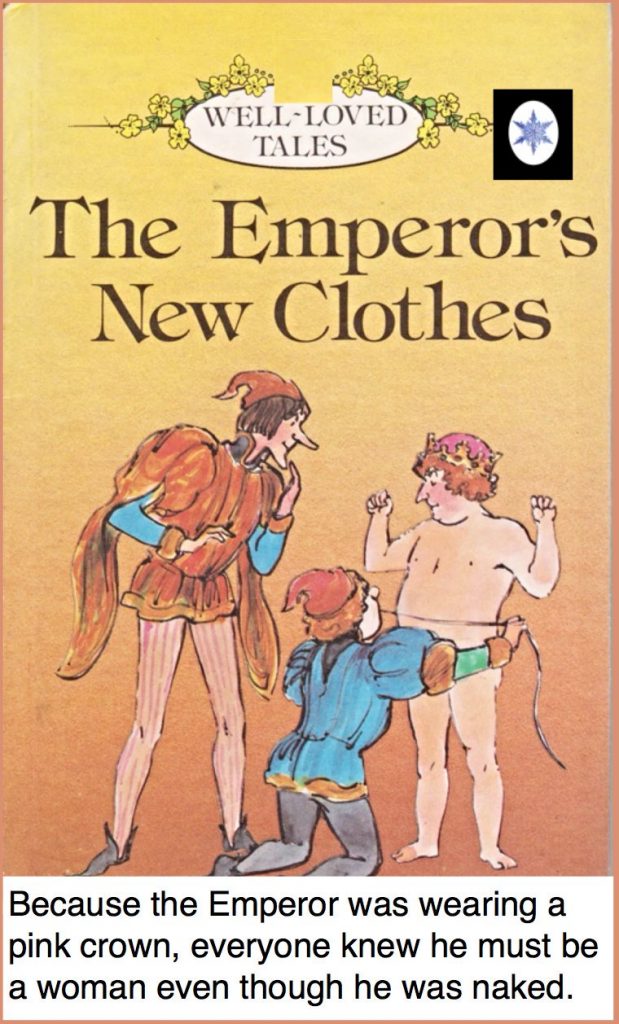 “That’s the thing about queer theory,” added Stella. “Because it’s all based on language, they haven’t bothered to base any substance in their arguments. They just think ‘I’ll be very clever with language so if I say I’m a boy, I’m a boy’, and that’s as far as it goes… People with an ideology they want to sell, they just focus on the language and dismiss the substance behind it in an extraordinary sleight of hand… It’s as if a sort of trick has been played and everybody’s afraid to say but the Emperor has no clothes… the people calling it out are getting such abuse that other people are scared to join with them. But there’s a great concept of ‘the crowd are watching the crowd’ and that’s how all revolutions start, that’s how movements happen. The crowd starts listening to the crowd.”
“That’s the thing about queer theory,” added Stella. “Because it’s all based on language, they haven’t bothered to base any substance in their arguments. They just think ‘I’ll be very clever with language so if I say I’m a boy, I’m a boy’, and that’s as far as it goes… People with an ideology they want to sell, they just focus on the language and dismiss the substance behind it in an extraordinary sleight of hand… It’s as if a sort of trick has been played and everybody’s afraid to say but the Emperor has no clothes… the people calling it out are getting such abuse that other people are scared to join with them. But there’s a great concept of ‘the crowd are watching the crowd’ and that’s how all revolutions start, that’s how movements happen. The crowd starts listening to the crowd.”
Question Time
Culpability
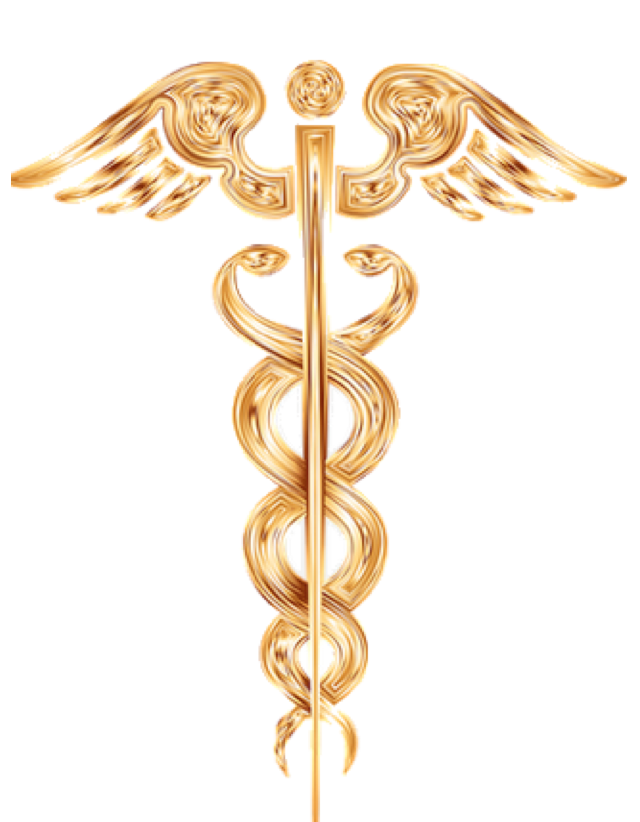 A woman mentioned her trans-identified young-adult son has returned home with medication after just one visit to the Tavistock. He is over the age of consent, but she has been consulting with her GP who referred him there, she wondered: is there a code of conduct and responsibility that GPs can be held to?
A woman mentioned her trans-identified young-adult son has returned home with medication after just one visit to the Tavistock. He is over the age of consent, but she has been consulting with her GP who referred him there, she wondered: is there a code of conduct and responsibility that GPs can be held to?
The panel seemed unsure, they didn’t know the health system well enough to be able to answer that question, although they agreed there should be some route to challenge both private and NHS care. It was acknowledged that a GP has a responsibility to do no harm and suggested that she might want to approach the GMC.
“It’s a difficult position you’re in there,” agreed Stella, “Until harm is done, how can you say harm will be done? That’s the problem, people aren’t getting the appropriate care they should be getting.”
Learning from mistakes
 Someone asked about the Cumberland report, an investigation into harmful medications and critical of the NHS. The title was ‘first do no harm’ but this report was not mentioned in discussions of the Tavistock, had it had impact on treatment for young people?
Someone asked about the Cumberland report, an investigation into harmful medications and critical of the NHS. The title was ‘first do no harm’ but this report was not mentioned in discussions of the Tavistock, had it had impact on treatment for young people?
The panel had not seen anything linking the report and the Tavistock, but Stephanie said that “treatment of gender dysphoria in young people is the biggest medical scandal we could possibly imagine. We’re allowing children to be sterilised and lose normal sexual function along with all sorts of other permanent effects on their health, their bodies and their appearance.”
The medical profession does make mistakes, she observed, and when it does it attempts to rectify them. It provides treatment based on available research and if bad effects are revealed by further research, then treatment plans are changed. She reminded us that we are going through that process now, through the courts.
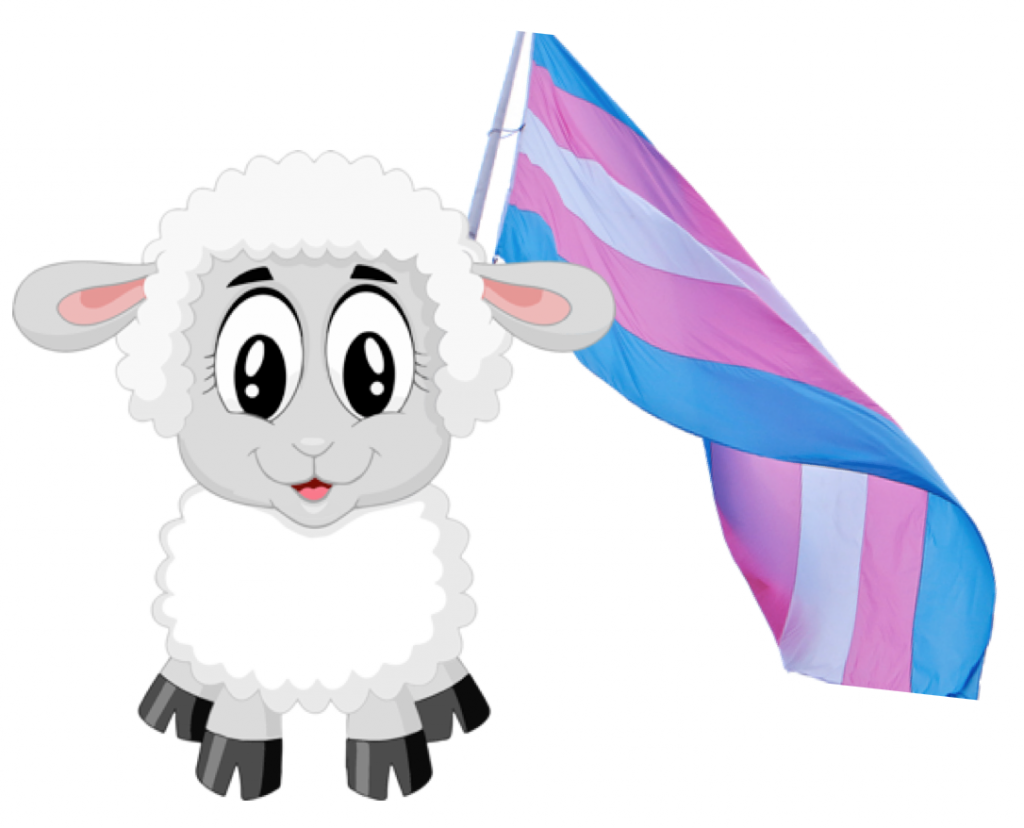 “Children have been politicised,” observed Davies-Arai. “The transgender child is the politicised emblem of a movement, not an individual child. The transgender child is separate from everything we know about children, about child psychology, about child development, about adolescent identity development. Everything we know, including the research on gender dysphoric children themselves before puberty- which we do know something about, which is that most would grow up to be gay.”
“Children have been politicised,” observed Davies-Arai. “The transgender child is the politicised emblem of a movement, not an individual child. The transgender child is separate from everything we know about children, about child psychology, about child development, about adolescent identity development. Everything we know, including the research on gender dysphoric children themselves before puberty- which we do know something about, which is that most would grow up to be gay.”
Heather said the question was heartening in that it held an assumption that the Tavistock would learn from medical mistakes, which she doubted.
“The Tavistock is so ideologically captured it doesn’t learn from its own mistakes; it doesn’t learn from the evidence which is put before it,” added Heather. “The Tavistock is completely unconvinced it has done anything wrong, it is going to the court of appeal in June to try to repeal the ruling of the court about puberty blockers… it is social justice which is the most important thing for the Tavistock rather than empirical evidence. They know that children are going to be sterilised by being given hormone treatment but they think it is worth it because there is a larger aim – social justice for the children who they imagine are actually transgender.”
Really, she concluded, it isn’t a question of irrationality but a completely different conceptual and ethical framework, “which is so far removed from what we are talking about here tonight.”
Avoiding a scandal?
 Susan Matthews observed that she had been struck by the fact that the ‘very brilliant QC’ Fenella Morris, counsel to the report which looked into three medical scandals which all affected women, had been hired by the Tavistock for the judicial review. She suggested the action seemed to suggest they might be trying to defend themselves against a comparable scandal.
Susan Matthews observed that she had been struck by the fact that the ‘very brilliant QC’ Fenella Morris, counsel to the report which looked into three medical scandals which all affected women, had been hired by the Tavistock for the judicial review. She suggested the action seemed to suggest they might be trying to defend themselves against a comparable scandal.
“We need to recognise the ideology itself is completely dehumanising,” added Stephanie, agreeing that a scandal was looming. “If you say a boy or a girl is an abstract concept in somebody’s head and biological sex, the body, doesn’t matter. If the body doesn’t matter, doesn’t really exist, we just made it up, then fertility doesn’t matter. Sexual function doesn’t matter.”
When we says the body is not important we are free to abuse it because it has no relevance: identity is disassociated from the body. Gender ideology disembodies us. And young people live so many hours every day in a virtual reality (online), where they can have an avatar that’s male or female, or an animal – this all adds to this idea that reality is subjective & there is a choice.
Risk & Reward
 A question was asked about how to balance risk and reward when we want to make a big impact but are concerned about minimising the risk to ourselves?
A question was asked about how to balance risk and reward when we want to make a big impact but are concerned about minimising the risk to ourselves?
Stephanie said that within the family, kids deserve us to be truthful, we shouldn’t be afraid to point out when there’s a difference of opinion. Be matter of fact about stuff that’s true, not getting into emotional reaction. Don’t get pulled into exchange or accusation and don’t lecture them or tell them what to think- but you can tell them what you think.
When dealing with schools, be clear and direct but respectful. We worry too much about being accused of transphobia, but talking about child development and biological sex is just talking about facts- your child’s right to be taught Biology for example. It should be possible to have a discussion without getting into a debate.
Stella added that when dealing with schools you can point out there are two schools of thought: that gender identity is innate, and that gender roles are imposed upon us. We can say,“you’re entitled to your belief and I’m entitled to mine and we can still talk.” This can allow for discussion.
Many teachers don’t even realise they’ve fallen into a belief system.
Misogyny and porn
Another question was ‘what can we do about the ubiquity of porn and its damaging effects?’
 Stephanie referred to the numerous porn sites introducing young boys to criminal content, teens, coercion, incest; how all these things were available just with a click. Double or triple penetration, anal, women throwing up, this is all marketed as sexual entertainment for men.
Stephanie referred to the numerous porn sites introducing young boys to criminal content, teens, coercion, incest; how all these things were available just with a click. Double or triple penetration, anal, women throwing up, this is all marketed as sexual entertainment for men.
We protect children from sex clubs, she pointed out, but the internet is our new public square and porn is ‘prominent on the high street of our virtual world’. Online, we don’t have regulations to protect children and ‘teen’ is the search term most put into Google by porn hunters.
“Why should it be a basic right of men to watch the abuse of women?” asked Stephanie. She added that it ‘says everything’ about women’s status in society that they are seen as objects to be used. She commended the work of Gail Dines, observing, ‘ it’s women, and women’s groups, who are putting in all the work to challenge this, it’s not the government, it’s not society as a whole asking questions of itself.’
‘There’s a relationship between gender identity ideology and pornography,” asserted Heather. “It’s as if people don’t see the harms to women- from men entering women’s sports for example. It’s not seen as part of a men’s rights movement, but as ‘poor men they identify as women’ and the rights are with them, not with women. It’s the same with pornography. If we question pornography we’d have to question men again, we’d have to question male sexuality & ask why is male sexuality constructed in such a way that they get pleasure out of domination and sexual violence. These questions are very destablising for society.”
 She referred to a discussion she had seen on Twitter where an attempt to discuss if it was fair for ‘transwomen’ to be in women’s sport was dismissed as hate speech and the organisation Fair Play for Women (FPFW) was characterised as a hate movement. The same dynamics, she said, occur when discussing pornography.
She referred to a discussion she had seen on Twitter where an attempt to discuss if it was fair for ‘transwomen’ to be in women’s sport was dismissed as hate speech and the organisation Fair Play for Women (FPFW) was characterised as a hate movement. The same dynamics, she said, occur when discussing pornography.
“ I do think of transactivism as a men’s rights movement…” said Heather. “It isn’t an equal opportunity exercise. When men identify as women, the impact on women is massive. When women identify as men the impact on men is negligible. We have to recognise that. Men wouldn’t put up with what women have to put up with – and nobody would expect them to. Can you imagine men being expected to stop calling themselves men?”
Getting the message out

Another attendee said that people in real life are horrified by, for example, men in women’s prison. It’s different to online. How do we get the message out there?
Stephanie reminded us that when FPFW talked to members of the public about the GRA, 95% of people were shocked to hear the implications of being able to self-ID as a woman. People had no idea that the issue was not really about ‘trans rights’ but about extreme gender identity ideology. For some people it’s impossible to speak out, but it is possible to do little things when you can. Speaking out in little ways is still doing a great job!
Heather agreed, and pointed out that there are two different things going on. People do understand its unjust for a man to compete in a woman’s sport, but what people think about children is very different. They think that there really must be children born in the wrong body or a NHS clinic would not be transing them!
“It’s difficult to persuade people that the NHS has been ideologically captured and we have work to do there.”
The Keira Bell case has shifted the narrative & brought it to the public eye. Heather expressed concern about what may happen at the court of appeal: if the ruling is overthrown those who objected will be seen as ‘transphobic’. The judge’s decision has already been called part of a backlash against trans rights.
“However,” she adds, “once the pack of cards starts to fall, it will fall quickly and we will look back and wonder how we ever tolerated such barbarism.”
Stella said the situation reminded her of when the Berlin wall fell. A journalist went out there to try to interview people who agreed with the regime but suddenly he couldn’t find them. Everybody was apparently against it and had been all along. She foresees the same thing happening when gender ideology is exposed. Currently, people aren’t aware of the heavy burden involved in transition, or of the existence of detransitioners.
“People think it’s a 21st century version of gay and an opportunity to show how kind and liberal they are. That’s how far they’re thinking.”
Facing the Future
 Finally: what hope is there for the LibDems?
Finally: what hope is there for the LibDems?
A party member said she was surprised by the party position, that the party’s usual rational focus on data and evidence all goes out of the window on this issue. Another party member agreed, she had stood for parliament and had complaints made against her because of her concerns about this issue. She spoke of the ‘self-delusion and cowardice of the people who lead us’ and her ‘daily struggle’.
A candidate for a by-election in a major city said she didn’t feel she could really speak out about the issue. She knew she had to be careful about what she said and exercise an element of self-preservation.
“If I’m going to say stuff,” said another, “I have to allow people to have the free will to hate me for it, and if they want to attack me for it, fair enough. As long as I’m heard.”
“We’re liberals,” added another, “we’re used to discussion and debate and all these different points of view. That’s our strength.” She emphasised the importance of making factual points, with decency and respect & backed up with evidence. The more people speak out, the more others can speak out. “Little things are stepping stones.”
After a few more minutes discussion, Alison said if there were no more questions she’d like to thank Heather, Stella and Stephanie “so much, for an interesting session and a really stimulating conversation, in a time when we’re able to speak freely.”
The next event, she said, would be on 10th of May and those who signed up to email list at liberalvoiceforwomen.org would have first opportunity to get a ticket.
“We’d like to hear from you all with women friendly issues or problems that you’d like us to raise. Thank you to all of you who’ve attended, to our organisers and technical staff, but most of all to Stephanie, Heather & Stella for a wonderful evening.”
